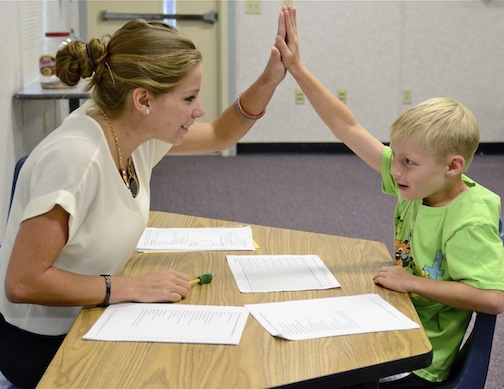Virtually all 33 UF ProTeach dual certification students who tutored youngsters with reading disabilities during a special four-week summer camp staged by the UF Literacy Initiative say their investment will reap huge benefits in their future teaching practices.
And, lest anyone forget, the same number of mostly elementary school students who spent an hour a day with their tutors at UF’s P.K. Yonge Developmental Research School in Gainesville will benefit greatly as well.
Caquatto, a member of this year’s UF gymnastics team that recently claimed its second straight national title, appeared to be just as excited as her student when the third-grader broke a personal record during a reading fluency exercise.
“Yesterday he read 73 words in one minute, but today he nailed it,” Caquatto said. “He got 102.”
“Yeah, and with no errors!” the student beamed.
“It’s the little victories that get you pumped up,” Caquatto said. “This program is awesome. I learn from kids all the time.”
Holly Lane, a UF special education professor who has headed the College of Education’s summer reading programs through the UF Literacy Initiative since 2009, says the “awesomeness” is the result of “incredibly passionate” student teachers who qualify for tutoring by attending a four-week practicum and five weeks of all-day classes.
“It’s a huge time commitment for them,” Lane said. “This particular group has been remarkably agreeable. They’re very dedicated.”
Among them is Karyn Ortiz, a part-time graduate student who appeared to have an excellent rapport with her student, a fourth grader with dyslexia.
“Good teachers learn to use their personalities as a tool,” said Ortiz, who used a bag of goldfish crackers as a teaching tool in a recent tutoring session. “This has been a paradigm shift for me – from direct teaching to manipulative teaching. I use the goldfish to help my student learn what the letter ‘g’ sounds like.
“I’ve always taken reading in English for granted,” she said. “This has been an eye-opener for me; I had no idea it could be so difficult for some children.”
Such lessons can only help them to become better teachers, according to Lane.
“Ten to 15 percent of the U.S. population has dyslexia, and more than 80 percent of all learning disabilities are due to problems in reading,” she said. “Early detection is key because those students won’t have the added burden of trying to catch up academically after falling behind because of their reading disability.”
Given those numbers, it doesn’t surprise Lane to see UF Literacy Initiative programs continue to grow.
“Word’s been getting around,” she said. “This year we had students from as far away as Tampa and Dunnellon. The parents are very appreciative of this program and the difference it makes with their children.
“One parent shared that her son made more reading progress in four weeks in this program than he had all year at school.”
Contacts
Source: Holly Lane, associate professor, School of Special Education, School Psychology and Early Childhood Studies; hlane@ufl.edu; phone 352-273-4273.
Media Relations: Larry Lansford, director, College of Education Office of News and Communications; llansford@coe.ufl.edu; phone 352-273-4137
Writer: Stephen Kindland, College of Education Office of News and Communications; skindland@coe.ufl.edu; phone 352-273-3449.
